—
Doug looked much younger asleep. It was comforting, in a way. A reminder that she was the one with the plans, that she was the one keeping things together.
You could only lose control if you let go. You could only lose anything if you let it go. She said to herself.
From the shoulder of Doug’s T-shirt she pulled a long, curly brown hair.
The ivy on the big house had yellowed, to disturbing effect. The vines seemed somehow malevolent now, a strangling, draining force, all roots and tendrils, fused with the stone.
Doug thought all through the rest of October about the risk involved in going behind Gracie’s back once and for all. He considered, too, that a political fund-raiser might involve Secret Service in some way. He asked Zee, casually, if there would be guards. She said, “It’s more like a Tupperware party.”
But the real threat wasn’t Gracie or even men with earpieces. It was Zee, who had surely already noticed how antsy he was lately. If they went through with it, he wouldn’t be able to look her in the eye for weeks.
He knew Zee wanted, more than anything, for him to finish the monograph — but she’d see this as more procrastination, as chasing fingerprints when he ought to be engaged in hard-nosed analysis. He could imagine her forehead creased, her hands on his shoulders. “You thought,” she’d say, “that you could finish your book by breaking into my mother’s attic? That was your plan? Show me how much you’ve written.”
He felt, bizarrely, that he was choosing between Edwin Parfitt and his wife — and not for the first time. The night he met Zee, at a welcome cocktail party at the graduate dean’s house, and she’d learned he was planning to write about Parfitt, she’d said, “ Parfitt . Wow. Oh dear. I put him in a category with Joyce Kilmer.”
Doug had been blinded by the shine of her black hair, by the thin straps of her dress, but he’d managed to call her out. “That’s because you know exactly one poem by each. You know Kilmer’s ‘Trees,’ and you know Parfitt’s ‘Apollo on the Mississippi,’ and they’re both sappy. They were completely different poets in every way. They weren’t even writing at the same time!”
“Yes, they are different. They’re both trite, but Parfitt is also opaque. And my God, you could march to his rhythms, right?”
Doug was holding a bacon-wrapped scallop that he had no idea what to do with. “He just had this one cheesy period: 1930 to ’32. Everything got all happy and rhymey. I mean, happiness is bad for poetry. And ‘Apollo’ was from that time. But that’s the stuff that got famous. You need to read his early sonnets. The Persephone series, and the Aeneas ones. And his last poems are devastating. Have you read ‘Proteus Wept’? Or ‘Pond’s Edge, Forgotten Girl’? It’s so different from what you think.”
“I’ve read it. He loved to eroticize those drowned women, didn’t he?”
Doug had decided by this point that he hated this bitch, this sharp-chinned bitch who was looking over his shoulder for someone better to talk to. “Well, he was gay,” he said. “If drowning turns you on, that’s your issue.” He’d stalked away.
Over the next year, as hatred melted into repartee and then to lust and sex and dating and engagement, he’d managed to convince her that Parfitt was someone she ought to like, though she never did become a fan. “You have a similar worldview,” he told her.
“What worldview is that?”
He couldn’t answer, but he wanted to say: Both of you — you feel so small that you’ll never realize the volume of your own voice.
Miriam stood at the counter, prying a small pumpkin open with a kitchen knife. She was making soup to go with the lasagna Doug had prepped that afternoon, or so she had announced, but Zee had yet to see so much as a pot. It was already six thirty, with the older Breens due at the coach house in half an hour.
Doug was in a suspiciously good mood, bouncing around and inviting Case to join him for a beer on the tiny, precarious balcony off the kitchen. Zee almost stopped them, almost said that if Case stepped on the balcony, it was sure to be hit by lightning and break clean off the house. His ankle should have healed twice over by now, but he’d strained the tendon again leaping from his flaming car. So here he was, four months after the initial injury, still in the boot, still in pain. If things continued this way, one day Case would just combust like his car had. Miriam would wander back to Texas alone with her garbage. Problem solved.
Now that things were going so well with Cole, Zee was meditating, that night, on the one issue remaining: how to guarantee that Doug finished saying whatever he had to say about Edwin Parfitt so the monograph could be under contract by spring. Despite his improved work ethic, whenever she asked how much he’d written it was never more than a hundred words, and he was never ready to show her.
With everyone occupied, Zee walked quietly back into the apartment.
Getting into Doug’s computer was so easy, compared with the risk of hacking Cole, that her pulse hardly rose. She looked first, optimistically, in the “Recent Documents” menu. The list included “In the last months of,” “To Whom It May Concern,” “Budget 99” and “Systems Work Folder 30, B.” She checked the first, the only one with any promise, hoping the document would refer to the last months of Edwin Parfitt’s life. It did. It read, in its entirety, “In the last months of Parfitt’s short life, these five poems comprised not only the (don’t repeat w/ thesis, but + PATHOS of Apollo on Miss. and Peonies).”
She knew he saved chapters individually, and he claimed he’d completed at least four, but this fragment was not encouraging. And if he hadn’t been writing, what had he been doing every day? Zee’s head began throbbing. The anger was there, strongly — the urge to throw the computer through the window and watch it shatter on the gravel — but more overwhelming was the sensation of the entire universe backfiring. Here was the precise opposite of everything she’d fought for. No: It was as if some malevolent genie had twisted her wishes into realities she couldn’t handle. Cole was imploding — confessing, even! — but Doug wouldn’t be ready to take the job. The job would open up just in time to go to some wunderkind who’d hold it for fifty years.
She should look at the other documents to make sure, and she should look at everything saved in his “Diss.” folder, no matter how old, and she should look on all the disks she could find, just in case he’d been an idiot and neglected to save his work on the hard drive. With twenty minutes before her aggressively punctual mother and stepfather would arrive, she began searching in earnest.
Miriam’s soup, she announced, wouldn’t be ready for another hour, but it was worth the wait. Doug served Bruce from the bottle of Mount Gay purchased specially for the occasion. The rest of them got to work on a Pinot Noir. Zee was still hiding in the bedroom, sleeping or seething or grading papers, and nobody proposed calling her into the kitchen.
Gracie wandered, inspecting the cabinet hinges and the chipped tiles by the oven. She paused by the old panel right next to the refrigerator, about three feet square, that they’d painted over that spring with the same light blue as the rest of the kitchen.
“This was cheaply patched,” she said, “wasn’t it? Long before my time. I believe it’s where they cut to install the electricity. My grandfather had the big house all wired up just as early as it was ever done, but he left the colony director living here with no lights until, I don’t know, the thirties. He was never one to think of his employees.”
Читать дальше












